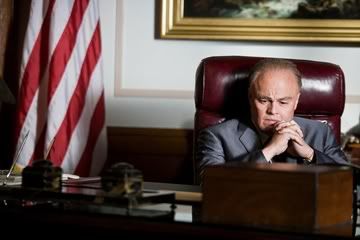
"J. Edgar" (2011)
"J. Edgar" should've been one of the best films of the year. There's no reason for it not to be, but here it is -- an epic missed opportunity that turns what could've been a riveting drama about one of America's most controversial figures into a long, ponderous mess of a movie. All the elements were there and ready for something great, too. It's directed by Clint Eastwood ("Million Dollar Baby," "Changeling") from a screenplay by Dustin Lance Black ("Milk") with Leonardo DiCaprio in the lead role as J. Edgar Hoover.
Clint
Eastwood is a master of mood, and here is no exception. The issue, however, is
how noncommittal he is on the subject. When ambitiously tackling such a man of history --
one who was powerful and hated but never understood -- you have to pull out the stops.
Eastwood doesn't. He puts all the pieces in place but never engages them fully.
We're left with something stolid and stagnant, not a juicy biopic as we might
have expected. It's still respectable and sophisticated entertainment because
Eastwood is incapable of making something not watchable. But the disappointment
cannot be ignored, the feeling that whatever opinion you may draw about J. Edgar,
neither side is with any conviction here.
And
while Eastwood's direction and Dustin Lance Black's script falter, the
acting stands tall. Leonardo DiCaprio disappears within the exterior of a
conflicted and unruly man. Hoover ruled the Federal Bureau of
Investigation like a mad bulldog from 1935 until his death in 1972. Nobody
dared cross him even though he schemed and blackmailed without shame -- this
includes a cruel, anonymous letter to Martin Luther King, Jr. After seemingly
playing the same character in both "Shutter Island" and
"Inception" last year, it's richly satisfying to watch DiCaprio
successfully transform himself, an acting feat that could no doubt earn him a
Best Actor nomination or even win.
Armie
Hammer of "The Social Network" plays Hoover's FBI associate director
and life-long companion, Clyde Tolson. It's remarkable to note that Hammer, a
relative newcomer since his breakout last year, holds his ground next to
DiCaprio and -- in some instances -- even outshines him. Both actors, however,
are hampered by layers of distracting prosthetic aging
makeup.
Tolson
is Edgar's dark secret, and a majority of Black's screenplay is purposely
speculative about their relationship. And while an important aspect of the
man's life, Black takes the easy way out. Sure Hoover was terrible and did some
terrible things -- but he was gay. And while he bases most of the film around
Hoover's repressed homosexuality, he also uses it as reasoning for his hidden
evils and paranoia about commies and radicals. His sexuality is not the
only reason -- that's too simple, and even with DiCaprio's performance this
tactic threatens to make Hoover one-dimensional, which he's certainly
not.
Scenes between Hoover and Tolson are nuanced and the film's best.
In a most wrenching scene, Hoover's mother Annie (played with stern severity by
Judi Dench) calculates what's going on between her son and Tolson. "I'd
rather have a dead son than a daffodil," she says. The effectiveness of
these moments, though, point to the film's greater downfall. Every gay man of
that generation was repressed and struggling with something profound -- that's
no mystery. So let's focus on what made Hoover different than the rest of those
men.






No comments:
Post a Comment